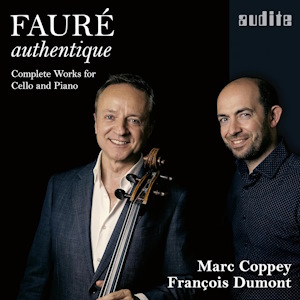
Gabriel Fauré (1845-1924)
Authentique – Complete Works for Cello and Piano
Marc Coppey (cello)
François Dumont (piano, 1891 Érard)
Pauline Bartissol (cello II)
rec. 2023, Amphithéâtre, Cité de la musique, Philharmonie de Paris, France
Audite 97.825 [67]
Gabriel Fauré’s works for cello and piano fall into two basic categories: the short “salon” pieces, generally lyrical and expressive, and the two sonatas, written late in his life after deafness had taken hold, much more challenging to the listener, especially the First. The juxtaposition of the two types of music on the one disc, while making sense for the collector, can lead to some rather jarring track transitions.
If you know his piano quartets, quintets or violin sonatas, but are hearing the cello sonatas for the first time, then you will probably be surprised by the harshness (in places) and the (relative) lack of beautiful melodies. If, however, you know and like the cello sonatas, then you will be reading this on the basis of whether to invest in this new set. I don’t actually fall into either of these categories, having heard the sonatas before (Poltera & Stott on Chandos), but not being all that keen on them. Had I heard Coppey and Dumont’s recording first, then the “not being all that keen” opinion would have been “considerably disliked” instead. Theirs are very cool and unemotional readings (and that also applies to the shorter pieces as well). This approach simply doesn’t strike me as being right for Fauré. Yes, the First Sonata was written during the horrors of the First World War, so is hardly going to be sunny, but to make it so lacking in poetry …? The title of the recording – Authentique is “explained” in the booklet notes as referring to the interpretation, which “fully engages with the fluid rhetoric of Fauré’s musical language and does not impose a perpetual espressivo, which would be stylistically incongruous”, and also the use of an 1891 Érard piano, such as Fauré would have used. There’s no denying the latter is authentic, though the difference in sound compared to a 21st century grand is relatively small, less resonant and rich (or more transparent, as per the booklet). As for Coppey’s interpretation, I doubt any cellist uses a “perpetual espressivo” in Fauré or anywhere else, but some is appropriate and there seems to be an almost complete absence of it here.
Sadly, I haven’t finished being negative. The main problem for me is the sound of the cello: lacking in warmth, even nasal. While this actually suits the interpretations, it also magnifies the problem. I have not heard Marc Coppey on other recordings to know whether this is his standard mode of playing (and frankly, I have no incentive to find out).
Were this the only recording to comprise Fauré’s output for these instruments, this release might have some appeal. However, there are others bearing more or less the same title as this, including one by Steven Isserlis and Pascal Devoyon (RCA), which has received considerable acclaim. I haven’t heard this in its entirety, but I did stream a selection to allow me to make a comparison, one which is entirely in favour of Isserlis and Devoyon. The cello sound is so much warmer, the interplay between the two instruments clearer and the general feeling is more what I associate with Fauré.
Back when I began with MusicWeb, we had a system where recordings could be “awarded” a ThumbsUp (now called recommended), but also ThumbsDown for real disappointments. We haven’t used these for a long while, but if the ThumbsDown was still in existence, the recording would certainly “merit” it. I’m now going to listen to Domus play Fauré’s piano quartets to remind me of what his music should sound like.
David Barker
Buying this recording via a link below generates revenue for MWI, which helps the site remain free


Contents
Papillon, op.77
Berceuse in D major, op.16 (arr. cello and piano)
Cello Sonata no.1 in D minor, op.109
Romance in A major, op.69
Élégie in C minor, op.24
Sérénade, op.98
Sicilienne, op.78
Cello Sonata no.2 in G minor, op.117
Après un rêve (arr. Pablo Casals)
Allegretto moderato for 2 cellos
Dolly Suite, op.56, no.1 Berceuse (arr. Marc Coppey)

















